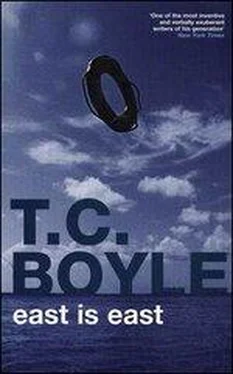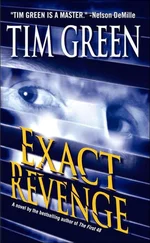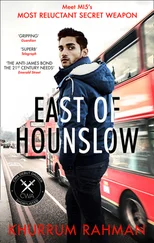Like his friends and neighbors at Hog Hammock, Olmstead White spoke in the Gullah dialect of his ancestors, a dialect rich in borrowings from the Hausa, Wolof, Kimbundu and Ibo of West Africa. Along with the dialect came the dim linguistic memory of that faraway continent and the tribal rites and superstitions that had bloomed there in the eternal days. Olmstead White was deeply superstitious, as who wouldn’t be in a world without reason or explanation, a world seething with spirits and hexes and voices in the night? He believed in haunts and specters, believed in hoodoo and juju and spells and curses and hags who put the mouth on you and made you wilt like a stalk of celery left out in the sun. He did his best to placate Wheeler’s spirit with gifts of clothing, a deck of cards, the odd magazine and a choice bit of his evening meal, each and every night. The plate was always on the ground the next morning, and it was always licked clean. Was it the raccoons, the opossums, the hogs, the hounds, the crows that gorged on that food? Maybe so. But only Wheeler knew for sure.
Well, the bacon fat sizzled and popped and the sweet oyster smell made a fancy Charleston kind of potted-palm restaurant out of the two-room clapboard shack—painted blue and with a blue pyramid slashed on the chimney to ward off hags—and Olmstead White thought nothing and the stirring fork moved in his hand as if by its own volition. The room was hushed. A fly buzzed at the screen. It was then, as the fly struggled and the world slowed down like a worn old carousel, that he came to himself and sensed another presence inhabiting the hazy space of the room. His back was to the door, his hand stirring, the radio whispering and Dale Murphy going down on strikes and nothing had changed, nothing at all, but as sure as he knew he was alive and breathing he knew there was someone—or something—there with him.
He moved like a man coming out of a coma, like Br’er Rabbit stuck to the tarbaby, his hands trembling as he remembered Varner Arms and how he was found dead in his own kitchen, blood spattered on the walls and hag’s hair—wild black hanks of it—scattered across the linoleum like a greeting from the darkest pit. His shoulders were rigid, his neck like a flagpole planted deep in the earth. But slowly, ever so slowly, he swiveled his gray-bristling chin till he presented his profile and one wild eye to whatever or whoever stood in the doorway behind him.
What he saw there, through the contracting lens of that one wild eye, froze his heart. What he saw was Wheeler, his brother Wheeler, risen from the grave and with his skin gone the color of leaf mulch, Wheeler, wearing the red cotton button-up shirt and denim overalls he’d left draped over the hard slab of the tombstone not three days ago. “Wheeler!” he cried, jerking around awkwardly and throwing up his arms in extenuation, “I didden mean it, I didden, I never should of called you them low mizzable things on the day you done pass on, but I—” and then he stopped cold. This wasn’t Wheeler standing there in his kitchen with a look on his face like he’d just gone and taken a dump in his own pants … this wasn’t Wheeler with the overalls pinched round the gut and stuck halfway up his shins and the slanting eyes and iron-straight hair hanging in his face … this was, this was some kind of Chinaman or something. But what was a Chinaman doing in Olmstead White’s kitchen in Hog Hammock on Tupelo Island? It mystified him. It baffled him. In the end, it upset him more than any six hags and apparitions could ever have. “Who you be?” he roared.
For his part, Hiro was no less shocked than the black man who stood twitching and jerking before him. In a delirium he’d staggered out of the salt marsh and up onto solid ground, his dead mother and his lost father dancing round him like fairies, root beer floats and slurpies and stone jugs of cold sake in their fluttering hands, and he’d found a rain puddle there, nothing more than diluted mud really, and he’d buried his face in it. By then the smell of cooking fat was overpowering and near and he pushed himself up and went for it at a trot. That was when he’d found the gravestones—crude rock slabs poking up out of the weeds like something he’d seen in a spaghetti Western. The first of the markers caught him in the shin; the second grazed the side of his face as he went down. When he untangled his feet and pushed himself up, he saw the shirt and pants, an overturned plate, a string of dried peppers and a weathered deck of cards. He didn’t think, couldn’t think, the smell of deep-fried fish—oysters, yes, oysters—driving all else before it, and in half a minute he’d exchanged his torn and filthy clothes for the shirt and overalls. He was hopping, actually hopping as if in some child’s game, as if he were in a sack race, as he shrugged into the overalls and slashed through the garden toward that supreme and dictatorial smell.
But now, here he was, in strange stolen clothes in a stranger’s house and the stranger was shouting at him. Worse: the stranger was a black man, a Negro, and he knew, as every Japanese does, that Negroes were depraved and vicious, hairier, sweatier and even more potent than their white counterparts, the hakujin. They were violent and physical, they were addicted to drugs and they thought only with their sexual organs. He’d seen one once, in the streets of Tokyo, a bēsubōru player named Clarence Hawkins, first baseman for the Hiroshima Carp. An awesome man, like a walking statue. But he had no heart—no hara —and he wasn’t a team player. Here was a man who could have hit a home run with every swing of the bat and yet he refused to take practice with the others, refused the calisthenics and the drill of the thousand fungoes and running in the outfield and the cold baths that demonstrated team spirit and a will to win and guts and determination. The pitchers gave him nothing to hit and the umpires called everything a strike, even if it bounced, and within the year he was back in America. That was a Negro. And here was another, shouting at him in his incomprehensible gibberish.
“Shipwreck!” Hiro shouted back, waving his arms in imitation of the gaijin. “I am starving. Please, I beg you, give me something to eat!”
Olmstead White heard him, but for all the good it did, Hiro might as well have been talking Japanese. “Somesing eat” was all that came through, and even that didn’t register, so alien was Hiro’s accent—and even if it had, the sequel would have been no different. Feeling trapped in his own kitchen, feeling scared and embarrassed and angry, delivered from the haunts and hags and into the hands of a stranger—an Asiotic Chinaman, no less—Olmstead White reacted in the only way he could. Before him, on the table, lay the butcher knife, the one he kept honed for punching through the stiff bristle of his Christmas hog and the soft underbelly of opossum and deer. He looked at Hiro, looked at the knife, and snatched it up.
Hiro could sense that the situation had deteriorated. The veins stood out in the Negro’s neck and the whites of his eyes were swollen. He kept shouting and there were flecks of spittle on his lips. It was obvious that he hadn’t understood a word. And now he had a knife in his hand, the blade ugly with use. Behind him, the oysters sent up their ambrosial aroma.
It looked bad. It did. Hiro should have turned and fled, he knew that, and he knew too that the blade was sharp and the old man tenacious, a wild beast surprised in its lair. But the oysters exerted their influence, and he recalled the words of Jōchō: A true samurai must never seem to flag or lose heart. He must push on courageously as though sure to come out on top. Otherwise he is utterly useless. “Somesing eat,” he repeated.
Читать дальше











